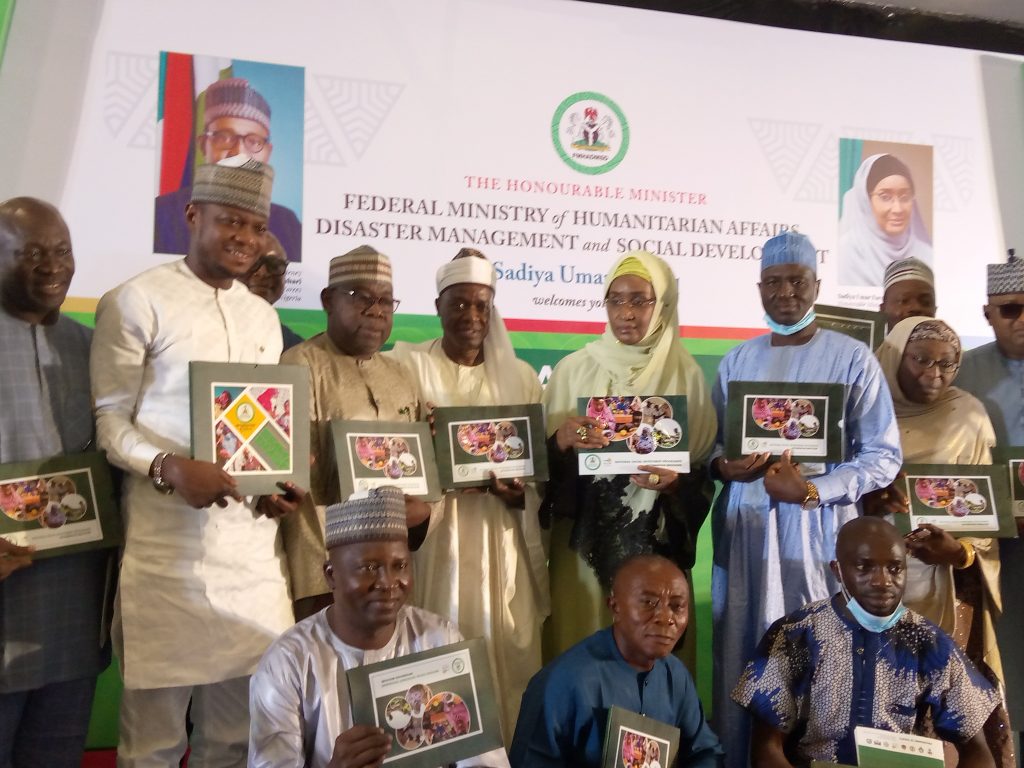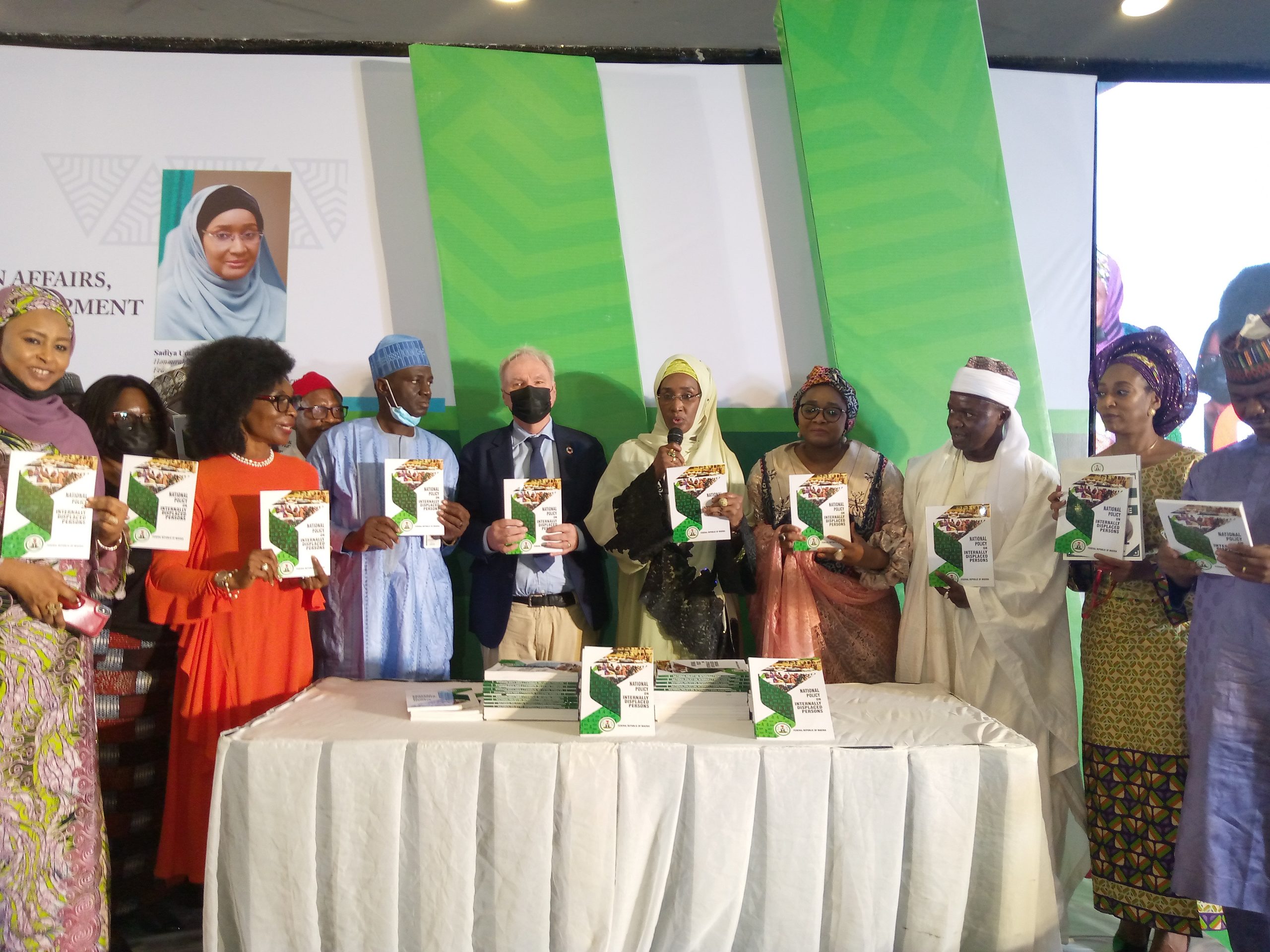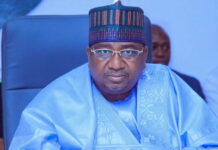By Chimezie Godfrey
The Federal Government has launched the national policy on Internally Displaced Persons ,IDPs, as a framework for national responsibility on prevention and protection of citizens from internal displacement.
The Minister of Humanitarian Affairs, Disaster Management and Social Development, Sadiya Farouq announced this at the event of the first Humanitarian Open House with the theme,”Coordinating for Durable Humanitarian Solutions; the Journey so far” held Tuesday in Abuja.

Farouq noted that the “Open House” was necessitated by the compelling need to keep stakeholders and partners, including the media, fully abreast with the Ministry’s programmes and activities.
According to her, this is imperative to allow for accurate, consistent and sustained information dissemination of the mandate, vision, policy direction, activities, interventions and their huge impact on the lives and livelihood all Nigerians and others.
In the same vein, the Minister launched the National Policy on IDPs, which she said is aimed at addressing incidences of internal displacement, which include meeting their assistance and protection needs, among others.
According to her, the policy spells out principles guiding humanitarian assistance and implementation of durable solutions in situations of internal displacement in Nigeria.
She said,”Today is a day specifically set aside for the Ministry to engage with the media, strategic partners and stakeholders and offer them the opportunity to ask questions, get clarity and offer useful suggestions by way of their desired feedback.
“The Open House will encourage a nexus for discussion and interchange of ideas to enable the media practitioners report from an informed position, as well as provide stakeholders and partners first-hand information they can share and disseminate across their various platforms.
“Through this programme, we hope to provide a more engaging platform for the Ministry to lead the way through improved connectivity, enable more synergy and cooperation between and amongst stakeholders to support and empower more people, create more possibilities, provide access to more solutions, make things happen faster, and support the growing ranks of people of concern to access more interventions.
“As an integral part of this Open House, the Humanitarian Hub has been created as a veritable platform for the Ministry, its Agencies, partners and stakeholders to directly engage and connect with visitors, the media and other key partners and stakeholders.
“Beyond the robust engagement and information sharing the Humanitarian Hub will offer, it is equally expected to provide an opportunity for networking and sharing global best practices that will encourage the formation of enduring partnerships, improve collaborations and result in more impact and solutions for humanitarian challenges and social protection in Nigeria.
“Today, I am also launching to the world the National Policy on IDP, which was approved by the Federal Executive Council (FEC) in September 2021. As you are aware, the process of developing and adoption of the policy commenced in 2001, and within this period, the initial draft of the policy has been reviewed severally to reflect new realities and emerging trends in the humanitarian space in Nigeria.
“This policy aims to provide a framework for national responsibility towards prevention and protection of citizens and, in some cases, non-citizens, from incidences of arbitrary and other forms of internal displacement, meet their assistance and protection needs during displacement, and ensure their rehabilitation, return, reintegration and relocation after displacement.
“The policy spells out principles guiding humanitarian assistance and implementation of durable solutions in situations of internal displacement in Nigeria, and has adopted the human rights-based approach and its principles.”
Farouq pointed out that the policy integrated the provisions of existing international conventions, treaties and protocols on internal displacement, guided by the dictates of international humanitarian and human rights laws.
She added,”The policy draws extensively on the guidance of international and national frameworks on the prevention of internal displacement, as well as those on protection and assistance of internally displaced persons.
“The Kampala Convention, the UN Guiding Principles on internal displacement, and the Sphere Minimum Standards for Humanitarian Assistance have significantly defined the direction of this policy.
“This policy envisions an equitable and stable Nigerian society that is proactive and responsive to situations that could lead to internal displacement, where the right to life of dignity is guaranteed for all internally displaced persons, and where adequate measures and durable solutions exist to prevent and mitigate the impact of internal displacement on vulnerable populations.
“To ensure efficient and effective implementation of the policy, I charge the National Coordination Technical Working Group and other relevant stakeholders to immediately commence elaboration of implementation plan with clear roles and responsibilities of all actors.
“The plan should incorporate a monitoring and evaluation strategy, which will ensure compliance with policy framework and scope, as well as determining the extent of achievement of policy goals and objectives.”
The Minister also announced the commencement of the standalone process of domesticating the African Union Kampala Convention.
“Furthermore, I wish to formally announce that we have commenced the standalone process of domesticating the African Union Kampala Convention.
“The relevant stakeholders are hereby charged to come up with the draft bill for onward presentation to the FEC for approval and subsequent transmission to the National Assembly for necessary legislative action,” she said.
The Minister declared that the National Social Investment Programme (NSIP) is the biggest social protection and poverty eradication programme ever put in place by any government in Nigeria and one of the biggest in Africa.
She disclosed that the Ministry has achieved significant milestones in the implementation of the four clusters of the NSIP which include, N-Power, National Home-Grown School Feeding Programme (NHGSFP), the Conditional Cash Transfer (CCT); and the
Government Enterprise and Empowerment Programme (GEEP).
She hinted that the GEEP is increasing financial inclusion by on-boarding beneficiaries into the formal financial system of banking, adding that the federal government would soon commence the disbursementof the GEEP 2.0 loans to successful beneficiaries.
“GEEP is also increasing financial inclusion by on-boarding beneficiaries into the formal financial system of banking.
“Registration of interested persons has been completed nationwide and digitization of the data collected is ongoing. We shall commence the disbursement of the GEEP 2.0 loans to successful beneficiaries shortly,” the Minister said.
Farouq also revealed that the last two and a half eventful years have been a potpourri of programmes, activities, interventions, partnerships, and sometimes associated with unforeseen challenges and unexpected humanitarian crisis.
She also said that the Ministry has initiated inter-ministerial coordination across several of the focal points to meet the needs of the citizens, particularly those who need a helping hand from Government to restore hope, provide support and succor.
She therefore expressed confidence that lasting solutions to the different humanitarian crises in the country can achieved with the partnership and collaboration of other stakeholders, as she President Buhari and the Vice President for their support.
“We have formally initiated inter-ministerial coordination across several of the focal points where our Ministry’s mandate intersects with other MDAs, including the private sector and with International Development Partners, NGOs and INGOs.
“Our primary goal is to meet the needs of the people who need a helping hand from Government to restore hope, provide support and succor, as well as an enabling environment for recovery, rehabilitation and inclusion, while ensuring their human dignity is upheld at all times.
“I must, at this point, reiterate that the continuing support and encouragement we are receiving from His Excellency, President Muhamadu Buhari and His Excellency, the Vice President, Professor Yemi Osinbajo, has significantly assisted us to make appreciable progress in fulfilling our mandate.
“We are also grateful for the support, partnership and collaboration we have enjoyed from Ministers, State Governors, Members of the National Assembly, the Armed Forces and numerous other strategic partners,” the Minister said.
Other participants at event include, strategic partners, stakeholders, the media, the private sector, development partners, and CSOs/NGOs, among others.




